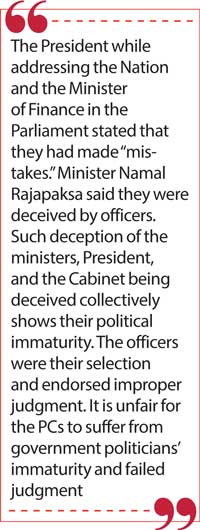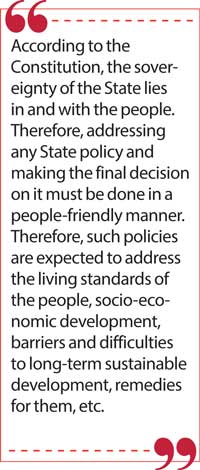Monday Feb 16, 2026
Monday Feb 16, 2026
Tuesday, 24 May 2022 01:39 - - {{hitsCtrl.values.hits}}

Introduction
A ‘New Government’ is installed with the appointment of a new Prime Minister. There are conflicting interpretations of the new government. Having ignored them, if only the current “disaster” faced by Sri Lankans is reminisced, attention is drawn to an ever reverberating subject. It is the absence of National Policies (NPs). The author does not look at the theoretical aspects adequately and attempts to view the issue practically as a layman. 
In a democratic context, political manifestos are presented by political parties to the electorate. Therefore, the public expectation that the contents of manifestoes would be incorporated into the NPs by the elected government is reasonable. When governments are criticised, the critics quote such manifestoes. But, it is difficult to elucidate a theoretical understanding that the NPs should remain static. Some contend that NPs are made by the President, Cabinet, officials, specialists, and from recent times onwards by clergy, “Aragalaya” and civil society. Simply stated these exercises are unprofessional, ad hoc, and uncoordinated.
There are several reasons for this status. Firstly, NPs are not static phenomena. They change over time. Their change and timeframes of change depend on various external factors, i.e., level of development, and political and international environment. Secondly, many difficulties are encountered in implementing the manifestoes. Thirdly, the state policies of a country like Sri Lanka which depend excessively on foreign factors and trends must be sensitive to ‘foreign’ issues. Fourthly, in Sri Lanka, despite there being a consensus on many state policies, the tendency is to change NPs following the fall of a government.
Formulation of policies at the national level is done by the ministers and officials and the institutions/parties supporting them; and, they are responsible to the Parliament, Government, society, and the nation. There is a hierarchy of State policy formulation. For example, the creation of a healthy nation is the first level national objective of a Health NP, and the prevention of non-communicable diseases or nutrition will be the split second level.
The constitutional character of the formulation of State policies
According to the Constitution, the sovereignty of the State lies in and with the people. Therefore, addressing any State policy and making the final decision on it must be done in a people-friendly manner. Therefore, such policies are expected to address the living standards of the people, socio-economic development, barriers and difficulties to long-term sustainable development, remedies for them, etc. 
The extension of the NPs to Provincial Councils (PCs) needs to be taken into consideration since they are partners of the State. Also, the importance of making collective efforts by the permanent executive (civil service) and the political executives with the provincial executives is thus crucial and highlighted. This emphasises the complexity of various sectoral involvements in NP-making.
Although the principles and fundamental duties governing the State Policy are enshrined in Chapter VI of the Constitution of Sri Lanka, it is negated by the provision of Article 29 thereof. The relative stability that ought to be in a State Policy is repudiated by the latter. It is due to the inability to receive justice through judicial review if the State fails. Therefore, the confidence that ought to be there in the policies of the State and the political and bureaucracy responsible for it will invariably erode. This situation needs to be remedied legally. The focus here will primarily be on the function of State policy-making.
Though not highlighted it is necessary to record the influencing involvement of the private/corporate sectors in NP-making, especially since their involvement with the State/Government, and the usage of NPs for development remains in their hands on a large scale. They enjoy benefits from NPs sometimes and face constraints due to NPs too.
List 11 of the 13th Amendment to the Constitution states that the “National Policy on all Subjects and Functions” is a function of the centre. But, since it appears as an excerpt, it transposes interpretation. However, this has been interpreted and implied to denote that the formulation of State Policies is vested in the “Central Government”, (which is a wrong usage not being a federal state). Though decades elapsed since this appeared in the Constitution, no accepted mechanism has been established for policy formulation. If one asks ten ministers, a bet could be taken that ten interpretations and mechanisms would emerge. Consequently, policies are formulated haphazardly attracting criticisms on policy formulation, its process, and acceptability.
Constitutional precedents of policy formulation in Sri Lanka
Attention is drawn to (Appendix II, of the 13th Amendment) on ‘Land and Land Settlement’ where the Constitution specifically mentions a methodology to formulate an NP: “The Government of Sri Lanka shall establish a National Land Commission which would be responsible for the formulation of national policy with regard to the use of State Land. This Commission will include representatives of all Provincial Councils in the Island”.
It can be said that this constitutional provision could serve as a guide to formulate NPs. The first guidance is that the Government can formulate NPs through a sub-agency of the Government, [herein, the National Land Commission (NLC) under – 3:1 of Appendix II]. Secondly, the Government can decide its scope as required (here is the ‘use of State land). Therefore, such an agency could formulate NPs for any subject. Thirdly, it is possible to operate with sub-government agencies through such an NP, (here, the PCs). Therefore, it is necessary and possible to focus on sub-government institutional requirements. PC representation at the Commission is hence provided in this Appendix.
According to this Appendix (in 3:2), a Technical Secretariat is to be established by the NLC. This Secretariat will direct the general norms on land use. Constitutionally, Appendix 3:3 also stipulates the areas needing addressing.
Finally, Appendix 3:4 states that the PCs should exercise the powers devolved to them with due regard to the NP formulated by the NLC.
Accordingly, all supportive elements such as the institutional structure for NP formulation, areas that should be included in its performance, the extended scope to the relevant state levels, etc., are decided. Accordingly, a common mechanism can be devised for other NP-formulation. It has constitutional attribution.
Although in the absence of such a specific institutional structure, NP formulation has been pursued for decades. The normal process of NP formulation had been to compile a ‘White Paper’ by selected technical experts and formulate the NPs based on it, at the ministry/bureaucracy level, with the participation of political authorities. Thereafter, the national consensus is confirmed by a parliamentary nod.
Stages of State policy formulation
An NP formulated by a government goes through several stages from its inception to the end. Namely:
(i) Attention to formulate policy
(ii) Completion of policies
(iii) Decision to implement
(iv) Implementation
(v) Review
(vi) Completion
(vii) Reformulation of NPs on demand
Attention to policy formulation usually happens on strong public demand for their formulation. For example, the anti-drug NP depends on the severity of violence it inflicts on society and the representations and interests shown by the community.
The State policy is created by the approach, adopted to solve the problem. It may be based on the recommendations of a committee or a study. (e.g., anti-smoking policy). For an NP, there could be promoting and opposing groups. For example, the policy against smoking is quoted.
Enactment of laws and regulations (e.g. Policy on environment and regulations, Manuals) are required to implement the State policy. The establishment of the organisational structure, recruitment of specialists, research and development, and fulfilment of various means required to provide other services are involved in the implementation of the policy. (E.g. processes involved in the functioning of the Central Environmental Authority, like Environmental Impact Assessments).
The level of efficacy in the implementation of an NP is evaluated through a progress review achieved through scientific evaluation methodologies.
An NP is terminated when it is obsolete. The obsolescence could occur depending on economic and social developments, as well as the changes in political ideologies.
Formulation of NPs and PCs
The formulation of NPs occurs at the Centre and some expect that the PCs also should follow the same policy. It raises legal as well as political and ethical issues as PCs are established democratically, sometimes by party representation being at cross-roads with the government, and possess elected institutional structures, responsible for Provincial Planning (List 1, Item 2 – Plans – implementation of economic plans of PCs). For such planning, policies are relevant.
The devolution of political power questions the ethic of the exercise of this policy-making right by a remote political authority in Colombo. However, since PCs are not national-level organisations, they can formulate provincial policies matching that of NPs.
Without adhering to any step stipulated here, NP formulation has been carried on. Several recent examples can be quoted. For enhancing the tax limits in December 2019, reduction of Value Added Tax (Taxation NP), prohibition of chemical fertiliser importation (Agriculture NP), action pursued on foreign debt (Financial NP), etc., it was observed that studies were not carried out. The advice offered by experts was not heeded. It created a massive economic downturn. These affected PCs too.
Finally, the President while addressing the Nation and the Minister of Finance in the Parliament stated that they had made “mistakes.” Minister Namal Rajapaksa said they were deceived by officers. Such deception of the ministers, President, and the Cabinet being deceived collectively shows their political immaturity. The officers were their selection and endorsed improper judgment. It is unfair for the PCs to suffer from government politicians’ immaturity and failed judgment!
Stabilising policy formulation
The important steps to be taken in respect of the mechanism of policy formulation could be listed:
(i) This NP formulation mechanism must essentially gain constitutional approval. It should by constitutional obligation bind the political and permanent executives accountable. The related authoritative appointments must be made by the Constitutional Council under a special law, (e.g. Office of the Missing Persons). The existing mechanisms for these purposes are inadequate. It should be constitutionally/legally stated that state agencies should adhere to the NPs recommended by the proposed Commission. For this purpose, it is essential that the policy requirements of the sub-government institutions also be taken into consideration; as such, it is necessary that the PCs and any other alternative institutions are also represented in this policymaking mechanism.
(ii) This constitutional provision must be the forerunner and guide to the formulation of NPs. We must adapt to the seven functions listed earlier. For example, the establishment of a National Policy Formulation Commission (NPFC) by the Constitution, like the NLC, is recommended as Government’s sub-agency. When it is established with presidential authority, it will be linked to the Presidential Secretariat, and if the President relinquishes the executive powers, it could be attached to the Prime Minister’s Secretariat.
(iii) The establishment of subject-wise functional units in the NPFC is essential. Therefore, specialised divisions in various disciplines such as agriculture, industry, planning, research and development, education, environment, etc., should be established in the NPFC, with experts possessing subject knowledge of international standard, experience, and academic strengths.
(iv) Proper coordination is required when sectoral policies are applied at a sustainable level because there must be hyper-rationality when limited resources are applied to unlimited needs. Therefore, it is more appropriate and also advisable that this NPFC is headed/represented by the President or Prime Minister. The Indian NITI Ayog methodology is a process that can be emulated with necessary modifications. In the best of NP formulations, there had been failures, as NITI Ayog that could be flagged for agricultural policies that created large rumpus in India.
(v) It is important to formulate NPs using a bottom-up approach in decision making; such an authority could have a positive impact on making prompt decisions. Since specialists also could be muted by hyper-political authorities their participation could be questioned. The higher authorities must maintain open relationships with such specialists.
(vi) There is a popular belief in the country that the PCs and State-Owned Enterprises (SOEs) are white elephants. As far as SOEs are concerned, it is a fact that they have become a heavy burden on the national budget and should no longer be allowed to function freely “by Ministers” as happen now. Without having them incorporated into the NP, the government is more likely to fall into an economic abyss. On the other hand, such activities need to be subjected to a sustainable decision-making process. Perhaps, through such an NP, it may even be necessary to take stern action against such institutions as applicable. Considering the involvement with PCs and SOEs it will be appropriate to keep the NPFC above the general administrative status.
(vii) The NPFC should be a technically super-office. NPs formulated by all sectoral units should be coordinated and brought before the Sectoral Oversight Committees of the Parliament after their revival. It can be a conduit for the government to bring policies to the attention of the Parliament that ensures the involvement and accountability of the people to NPs.
(viii) As strategic planning from the grassroots level and above takes place involving all functional bodies such as PCs, Local Government bodies, Statutory Government Institutions, even private sector Chambers when required, etc., it would be possible to implement the NPs smoothly and allocate relevant resources and international financing consistently because all sectoral representations are involved in NP-formulation.
(ix) The establishment of an institutional structure and a process of this nature will certainly help institute a more comprehensive process than the White Papers prepared and the discussions held loosely. It may also involve the implementation of policies using superior methods, progress reviews, financial management, implementation of new plans based on progress and the needs; and, the NPs could be orientated to new dimensions.
(x) The implementation of NPs must be monitored by a team consisting of the Secretaries of the relevant Ministries. By doing so, the adverse development trends witnessed today consequent to the implementation of NPs only with the approval of the political executive could be prevented. The recent case involving the ban on the importation of chemical fertiliser by the incumbent government is cited as an unfortunate episode.
(xi) The proposed NP Framework should be planned for use for at least ten years. Although some NP changes could be made based on the technological advances taking place globally, and changes in world political circumstances, it should not be allowed as is done customarily, with a change of the governments. The NPFC should separate the policy framework into short, medium, and long-term durations and take necessary steps for their implementation, review, and reporting progress.
(xii) Accordingly, it should be noted that the implementation of this methodology will assure a ‘permanent status’ for NPs in the fullest sense of the word. Accordingly, they must be prevented from being destabilised of their official status following the change of the governments. It helps implement policies uninterruptedly and consistently, maintaining great institutional memory. To achieve this end, an appropriate follow-up system must be set up to evaluate the commitment, effectiveness of performance of the permanent executive, and the Public Service Commission should be empowered to take disciplinary action against the members of the permanent executive who do not meet those targets.
(This article has been prepared on a presentation by the author at a workshop conducted by the March 12 Movement.)